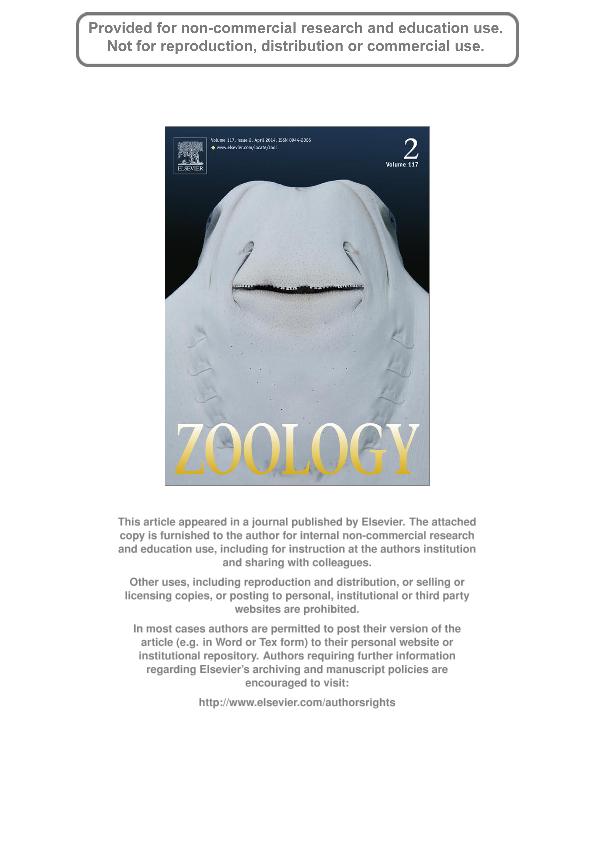Mostrar el registro sencillo del ítem
dc.contributor.author
Ituarte, Romina Belen

dc.contributor.author
Vázquez, María Guadalupe

dc.contributor.author
Gonzalez Sagrario, Maria de Los Angeles

dc.contributor.author
Spivak, Eduardo Daniel

dc.date.available
2018-01-24T17:58:02Z
dc.date.issued
2014-03
dc.identifier.citation
Ituarte, Romina Belen; Vázquez, María Guadalupe; Gonzalez Sagrario, Maria de Los Angeles; Spivak, Eduardo Daniel; Carryover effects of predation risk on postembryonic life-history stages in a freshwater shrimp; Elsevier Gmbh; Zoology; 117; 2; 3-2014; 139-145
dc.identifier.issn
0944-2006
dc.identifier.uri
http://hdl.handle.net/11336/34431
dc.description.abstract
For organisms with complex life histories it is well known that risk experienced early in life, as embryos or larvae, may have effects throughout the life cycle. Although carryover effects have been well documented in invertebrates with different levels of parental care, there are few examples of predator-induced responses in externally brooded embryos. Here, we studied the effects of nonlethal predation risk throughout the embryonic development of newly spawned eggs carried by female shrimp on the timing of egg hatching, hatchling morphology, larval development and juvenile morphology. We also determined maternal body mass at the end of the embryonic period. Exposure to predation risk cues during embryonic development led to larger larvae which also had longer rostra but reached the juvenile stage sooner, at a smaller size and with shorter rostra. There was no difference in hatching timing, but changes in larval morphology and developmental timing showed that the embryos had perceived waterborne substances indicative of predation risk. In addition to carryover effects on larval and juvenile stages, predation threat provoked a decrease of body mass in mothers exposed to predator cues while brooding. Our results suggest that risk-exposed embryos were able to recognize the same infochemicals as their mothers, manifesting a response in the free-living larval stage. Thus, future studies assessing anti-predator phenotypes should include embryonic development, which seems to determine the morphology and developmental time of subsequent life-history stages according to perceived environmental conditions.
dc.format
application/pdf
dc.language.iso
eng
dc.publisher
Elsevier Gmbh

dc.rights
info:eu-repo/semantics/openAccess
dc.rights.uri
https://creativecommons.org/licenses/by-nc-sa/2.5/ar/
dc.subject
Complex Life Cycles
dc.subject
Crustaceans
dc.subject
Externally Brooded Eggs
dc.subject
Predation Risk
dc.subject
Palaemonetes Argentinus
dc.subject.classification
Otras Ciencias Biológicas

dc.subject.classification
Ciencias Biológicas

dc.subject.classification
CIENCIAS NATURALES Y EXACTAS

dc.title
Carryover effects of predation risk on postembryonic life-history stages in a freshwater shrimp
dc.type
info:eu-repo/semantics/article
dc.type
info:ar-repo/semantics/artículo
dc.type
info:eu-repo/semantics/publishedVersion
dc.date.updated
2018-01-24T14:53:21Z
dc.journal.volume
117
dc.journal.number
2
dc.journal.pagination
139-145
dc.journal.pais
Alemania

dc.journal.ciudad
Jena
dc.description.fil
Fil: Ituarte, Romina Belen. Consejo Nacional de Investigaciones Científicas y Técnicas. Centro Científico Tecnológico Conicet - Mar del Plata. Instituto de Investigaciones Marinas y Costeras. Universidad Nacional de Mar del Plata. Facultad de Ciencia Exactas y Naturales. Instituto de Investigaciones Marinas y Costeras; Argentina
dc.description.fil
Fil: Vázquez, María Guadalupe. Consejo Nacional de Investigaciones Científicas y Técnicas. Centro Científico Tecnológico Conicet - Mar del Plata. Instituto de Investigaciones Marinas y Costeras. Universidad Nacional de Mar del Plata. Facultad de Ciencia Exactas y Naturales. Instituto de Investigaciones Marinas y Costeras; Argentina
dc.description.fil
Fil: Gonzalez Sagrario, Maria de Los Angeles. Consejo Nacional de Investigaciones Científicas y Técnicas. Centro Científico Tecnológico Conicet - Mar del Plata. Instituto de Investigaciones Marinas y Costeras. Universidad Nacional de Mar del Plata. Facultad de Ciencia Exactas y Naturales. Instituto de Investigaciones Marinas y Costeras; Argentina
dc.description.fil
Fil: Spivak, Eduardo Daniel. Consejo Nacional de Investigaciones Científicas y Técnicas. Centro Científico Tecnológico Conicet - Mar del Plata. Instituto de Investigaciones Marinas y Costeras. Universidad Nacional de Mar del Plata. Facultad de Ciencia Exactas y Naturales. Instituto de Investigaciones Marinas y Costeras; Argentina
dc.journal.title
Zoology

dc.relation.alternativeid
info:eu-repo/semantics/altIdentifier/doi/http://dx.doi.org/10.1016/j.zool.2013.09.004
dc.relation.alternativeid
info:eu-repo/semantics/altIdentifier/url/https://www.sciencedirect.com/science/article/pii/S0944200614000026
Archivos asociados
